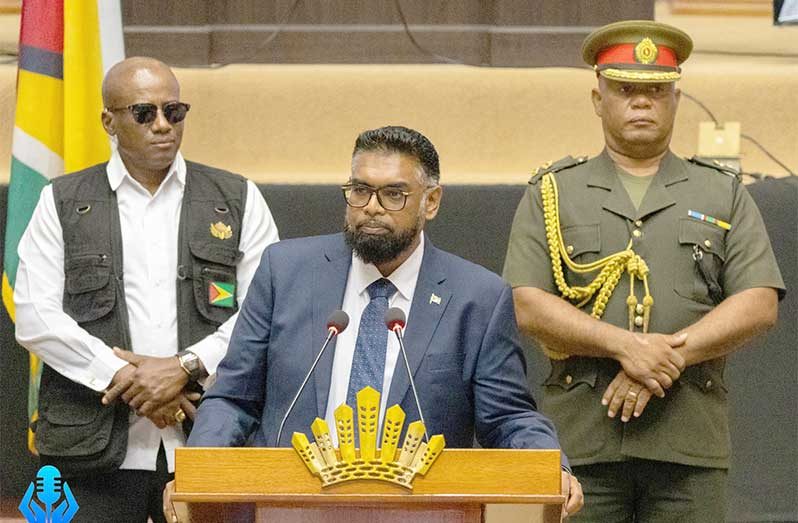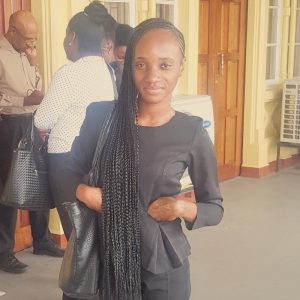–says borders being monitored, international community alerted ahead of Venezuela’s planned Essequibo elections
AS Venezuela continues with its aggressive posturing and plans to host an unlawful May 25, 2025, elections to supposedly elect a governor for Guyana’s Essequibo, President, Dr Irfaan Ali has assured citizens—particularly those residing near the border—that the Government of Guyana remains vigilant and committed to defending the nation’s sovereignty.
“You have nothing to fear,” the President declared on Monday, addressing growing public concern over the neighbouring country’s actions.
He added: “You’re living in what is our sovereign space, and we’re going to protect and ensure that our sovereign space is respected by all.”
Speaking confidently on the matter, President Ali reminded the nation that the International Court of Justice (ICJ) has already issued orders regarding the upcoming election.
“We are confident and rule-based, and we have always said that we ask Venezuela to respect international law,” Dr Ali stated, noting: “But we are not sitting back.”
The Guyanese leader emphasised that the government, the Guyana Defence Force (GDF), and all relevant national and international stakeholders are actively engaged in protecting the country’s territorial integrity.
“I want to assure you [in the border area] and all Guyanese that the Guyana Defence Force, the government and every stakeholder, we are putting everything in place to ensure that the sovereignty and territorial integrity of Guyana is always protected and safeguarded,” he said.

In response to whether the border is being actively monitored ahead of the elections, the President confirmed that robust surveillance operations are underway, although details remain classified.
The Head of State said: “Definitely, I cannot go into details, but I can assure you that we and our partners are keeping each other abreast. There is continuous analysis and continuous monitoring, especially in areas close to the borders.”
The President’s comments come amid escalating tensions with Venezuela, which has continued to lay claim to Guyana’s Essequibo region despite ICJ proceedings and widespread international calls to respect Guyana’s territorial sovereignty.
The elections, widely criticised by the international community, is viewed by Guyana as a violation of international law and an attempt to undermine the ICJ’s authority. Nevertheless, Dr Ali made it clear that Guyana will not be intimidated.
On May 1, 2025, the ICJ ordered the Bolivarian Republic of Venezuela to refrain from holding or preparing for any elections in Guyana’s Essequibo region, pending a final ruling on the ongoing border controversy.
The decision comes in response to a request by Guyana following Venezuela’s January 2025 announcement of plans to elect a governor and legislative council for what it claims to be the “Guayana Esequiba State.”
Venezuela is set to hold elections for the so-called Guayana Esequiba state during its upcoming regional polls on May 25, 2025—just one day before Guyana marks its 59th independence anniversary.
In its ruling, the World Court reaffirmed the provisional measures granted on December 1, 2023, and introduced a new, binding directive.
The court in its December 1, 2023 order, stated: “Pending a final decision in the case, the Bolivarian Republic of Venezuela shall refrain from taking any action which would modify the situation that currently prevails in the territory in dispute for which the Cooperative Republic of Guyana administers and exercises control over that area; and both parties shall refrain from any action which might aggravate of extend the dispute before the court or make it more difficult to resolve.”
The new measure explicitly states that, pending a final decision, Venezuela “shall refrain from conducting elections, or preparing to conduct elections, in the territory in dispute, which the Co-operative Republic of Guyana currently administers and over which it exercises control.”
This latest directive was adopted by 12 votes to three by the judges of the ICJ in The Hague, Netherlands.
The December 2023 order had already instructed Venezuela to avoid taking any actions that would alter the status quo of the territory under Guyana’s control and called on both nations to refrain from aggravating the situation.
Venezuela has since rejected the ICJ’s orders and vowed to proceed with its planned election.
“Nothing in international law allows the International Court of Justice to interfere in matters that are the exclusive domain of Venezuelan domestic law, nor to seek to prohibit a sovereign act,” a statement from the Venezuelan government read.
The Essequibo region, which comprises nearly two-thirds of Guyana’s landmass, has been a point of contention between the two countries for decades.
Guyana filed its Memorial in 2018, asking the United Nation’s highest court to confirm, in a final and binding judgment, the full legal validity of the October 3, 1899 Arbitral Award that established the international boundary between Guyana and Venezuela more than a century ago.
The ICJ is currently considering the validity of the 1899 Arbitral Award, and its final ruling is expected to settle the matter definitively.
The government has repeatedly called on the Spanish-speaking nation to refrain from any actions that violate Guyana’s territorial integrity or disrupt the peace and security of the Latin American and Caribbean region.
Guyana also urged Venezuela to comply fully with the ICJ’s orders, which are legally binding under international law.
Furthermore, the international community has backed Guyana in its efforts to draw attention to Venezuela’s activities, which are wholly outside the bounds of the rule of law.




.jpg)









